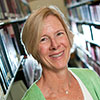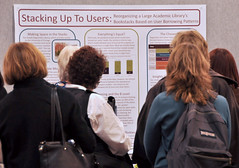This article is more than 5 years old.
The first day of this conference was jam-packed from early morning to midnight. This year I took a more disciplined approach to the programming than I usually do, so I had charted out my day’s plan of action. The logistics of this particular conference location made it easy to execute since our hotel is connected to the conference center and all the events and programming are taking place here.
The day started with a Serials Solution breakfast (it was hard on my low carb diet plan). I left before the end so that I could attend my first session of the day, Mashup or Crashup? This session was about two projects, at Emory and Georgia Tech, to consolidate merged service desks. Both schools aimed to consolidate their circulation and reference service desks and it was interesting to hear the comparison between the two approaches. One interesting difference was the way they planned to staff the new desk. At Georgia Tech, a driving force was to get librarians off the desk, yet they also made a decision not to use student assistants, because they did not think this would assure a minimum acceptable service level. At Emory, librarians stayed on the desk for 3-4 hours weekly as they feel it is an important way to gather “customer intelligence”. They had different approaches to the actual desk. Emory did simulations to test various pre manufactured options, while Georgia Tech has selected a custom millwork solution. One of the interesting aspects of this session was their use of polling via texting using Polleverywhere.com.

Both schools involved their students in the planning process through things like forums and surveys. They shared their training plan and implementation process. It was a good session to get ideas of how we might think of a consolidation project when the time comes!
ACRL has a track for contributed papers, and I enjoyed hearing two of them: ” Helping the hand that feeds you: supporting the research needs of campus executive officers” and “The Budgetary Importance of Building Relationships.” I’ve linked to both presentations so you can get the details. Both of these presentations have to do with the importance of politics and relationship building in creating value for the library and securing resources.
I have another vendor to thank for my next meal of the day, Ebsco puts on a big event (with another high carb menu). The product they were highlighting is the addition of Netlibrary to their lineup.
I had looked with anticipation at my first afternoon session which was a panel discussion about the recent ACRL Value of Academic Libraries report. I had studied the report last fall as I was doing some of my classwork at UNCG. The report aims to raise awareness of the need for academic librarians to become contributors to campus conversations on accountability and impact. The report “identifies the research documenting library impact that exists and where gaps occur in research about the performance of academic libraries”. The scope of the report is to provide
- A clear view of the current state of the literature on value of libraries within an institutional context
- Suggestions for immediate “next steps” in the demonstration of academic library value, and
- A “research agenda” for articulating academic library value.
It strives to help librarians understand, based on professional literature, the current answer to the question, “how does the library advance the missions of the institution?”
During this session researcher Megan Oakleaf highlighted important areas of the report, particularly 4 specific recommendations out of the more than 20 in the full report:
- Define outcomes
- Where possible, use existing data (do a data audit)
- Develop systems to collect data on individual library user behavior, while maintaining privacy
- Generate data that “plays well” with assessment management systems.
Lisa Hinchliffe (ACRL president who recently visited ZSR for the award presentation) talked about what administrators can do to get positioned to make the paradigm switch from assessing use to assessing impact and outcomes.
- Communicate assessment needs and results to library stakeholders
- Use evidence-based decision making
- Create confidence in library assessment efforts
- Dedicate assessment personnel and training
- Foster environments that encourage creativity and risk taking
- Integrate library assessment within library planning, budget and reward structures
- Ensure that assessment efforts have requisite resources
I think the report offers lots of food for thought in regards to helping determine what to do to assess our impact and to measure our value.
This image gives my impression of the post sessions. They are well attended, too well IMHO as I had trouble getting close enough to talk to the presenter or see the poster:
I’ve gone way past my self-imposed posting limit and have not finished sharing Day One. But it’s time to head to the next session, so I’ll post this and pick up another post later!

